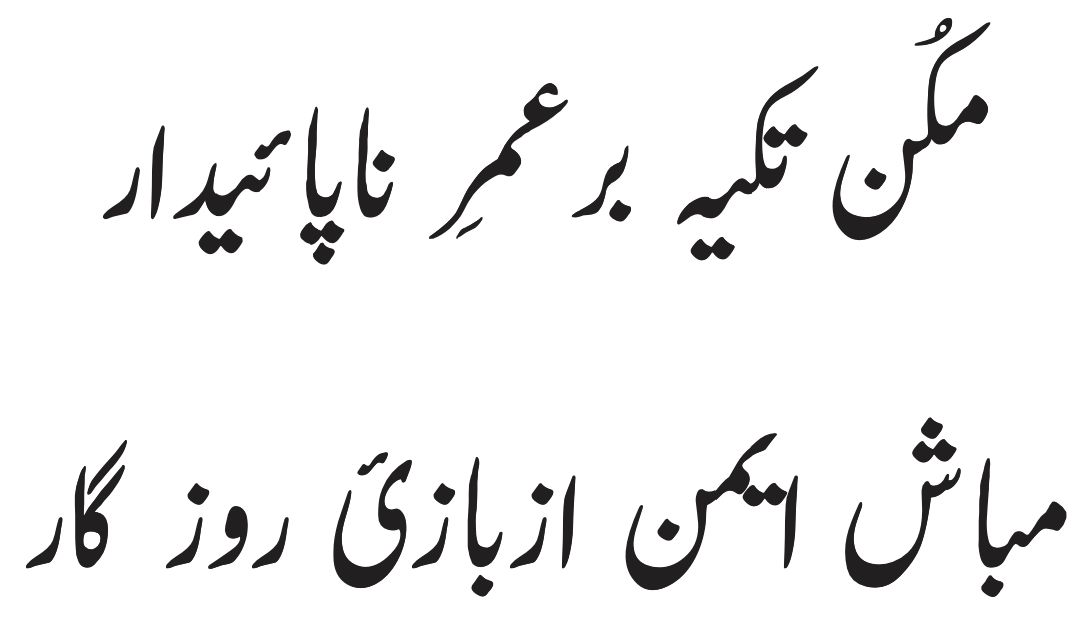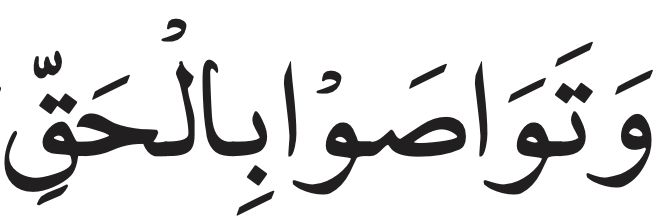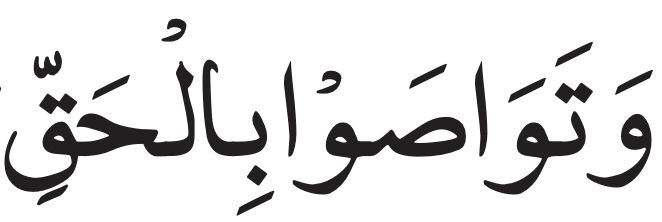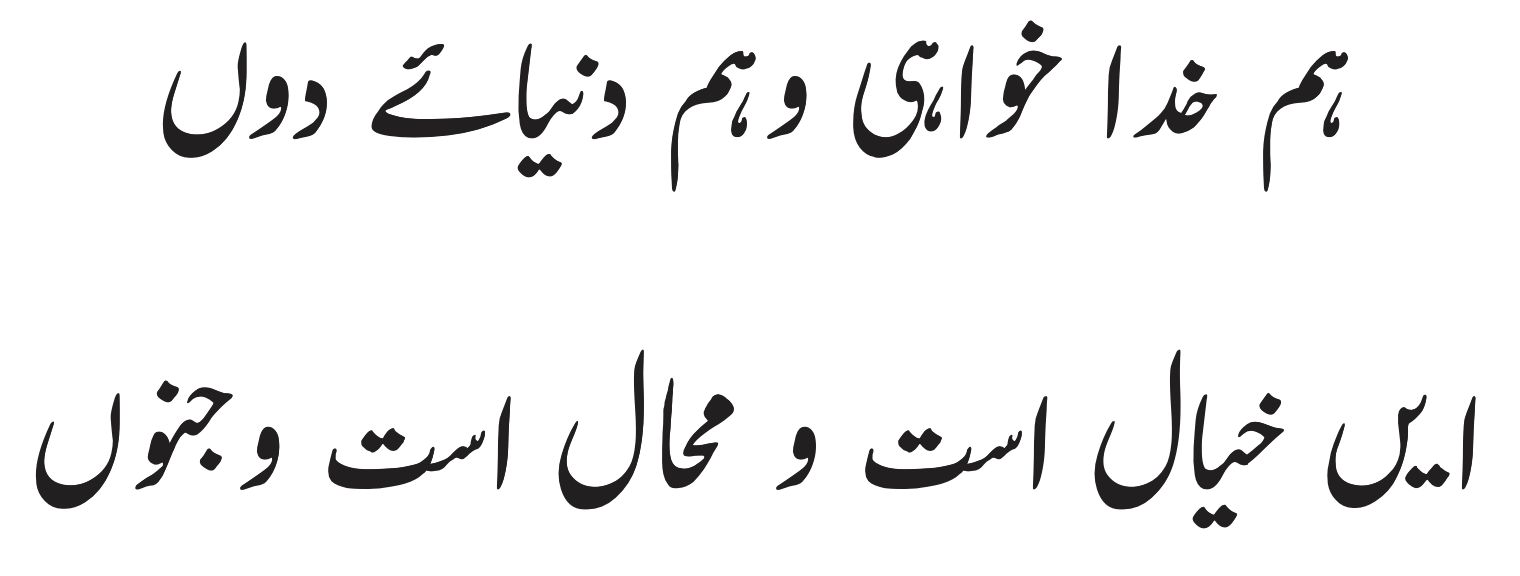
The impurity of one’s heart is not noticeable until many years have passed.
Atonement
The very first brick of religion is to recognise God. Until that foundation is well-placed, how can other deeds be pure? The Christians raise countless allegations against the inner-purity of others and they raise these objections whilst believing in a morally damaging concept such as atonement. I cannot understand how there can be any fear of accountability before Allah Almighty if one believes in the concept of atonement. Do the Christians not believe that the Messiah was tormented to repay for our sins to the extent that he was deemed accursed and remained in hell for three days? If with this concept there is punishment for sin, then what purpose does the Atonement serve? The very doctrine of atonement encourages sin. It is a matter of principle that the doctrine to which a person subscribes has a deep effect on them. One may observe that in the estimation of the Hindus the cow is immensely holy and sacred. The effect of this among the Hindus is to such an extent that even the urine and dung of a cow is deemed pure and used for purification. Their passion for the cow exceeds all bounds and this is the very reason that they have made this concept a part of their fundamental belief. Remember that fundamental beliefs are like a mother and deeds are the resulting offspring. When the Messiah serves as an atonement and he has taken upon himself the sins of those who believe, what reason is left for people to refrain from sin?
It is astonishing that when Christians speak of the concept of atonement, they begin their discourse from the mercy and justice of God Almighty. But I would ask, if one person is hung for the crime of another, then what justice and mercy remains? If it is proclaimed as doctrine that Christ has taken upon himself the burden of all sins—even those sins which are yet to be committed—then what reason is there for anyone to abstain from sin? If the teaching was that this atonement was limited to the Christians of that era, then this would have been another matter; but when it is accepted that Christ has taken with him the burden of the sins of even those who shall be born until the Day of Resurrection, and he accepted punishment for this purpose, then how unjust is it to seize a sinner? In fact, to punish an innocent person in the place of a sinner is injustice in the first place. But further still, the second injustice is to first place the burden of sin on Christ and give sinners the good news that he has shouldered their sins, yet punishing those who then commit sin. This is some strange deception, which the Christians will never be able to explain.
Belief in the Atonement Emboldens a Person to Commit Sin
If someone were to assert that belief in the Atonement enables a person to attain salvation from a life of sin, and the propensity to commit sin no longer remains within them, then this is a statement with no proof at all. For there is sin at the very root of this concept. The strength to abstain from sin comes from a fear of accountability to God. But how can there be any fear of accountability when it is accepted that Christ has taken upon himself the burden of our sins? From this, I conclude that a person who subscribes to such a concept can never be God-fearing, because they would deem unnecessary all such actions that have their basis in principles of fear of God. One ought to remember well that inner-purity always begins with concepts, if not:

The impurity of one’s heart is not noticeable until many years have passed.
Then we should also observe what practical examples of inner-purity have been demonstrated by those who subscribe to the concept of atonement. The sinful actions of people in Europe are known to all. Alcohol, which is the mother of crimes and the mother of evils, is so heavily consumed that its likeness is difficult to find in any other country. I read in a newspaper that if all the liquor-stores in London were arranged in a line, they would extend to a distance of 75 miles. Christians ought to reflect and tell us that when they have been given a certificate for the pardoning of sin, and any sin they commit is deemed forgiven, what shall be the result of such a concept?
If, God forbid, we subscribed to such a doctrine, this would have an immensely detrimental effect upon us. The lower self which incites the soul to evil is always in search of something to lean back on. Similarly, the Shias have fallen back on Imam Husayn, may Allah be pleased with him, and they say whatever they please, hiding behind the concept of taqiyyah. Due to this concept of taqiyyah and the belief regarding the sacrifice of Imam Husayn(ra), I can confidently say that very few God-fearing people exist among the Shias. Khalifah Muhammad Hasan writes that the verse 1 (We ransomed him with a great sacrifice) in the Quran speaks of the martyrdom of Imam Husayn(ra) and he is overjoyed by this point, as if he has discovered the essence of the Holy Quran.
(We ransomed him with a great sacrifice) in the Quran speaks of the martyrdom of Imam Husayn(ra) and he is overjoyed by this point, as if he has discovered the essence of the Holy Quran.
His ‘ingenuity’ reminds me of the story about the foolish man. As the story goes, a foolish man had a water pot with a hole in it. Whenever he would go to answer the call of nature, before he could manage to relieve himself and then subsequently clean himself, all the water would drain out of his pot. Finally, after many days of thought and reflection, the bright solution that he came up with was that he began to clean himself with the water first, before relieving himself; and he was very pleased with his solution. Khalifah Muhammad Hasan has come up with an insight and solution that is as clever as this foolish man when he derives that the verse 2 (We ransomed him with a great sacrifice) speaks of the martyrdom of Imam Husayn(ra). The Shias cannot so much as keep their mosques clean. I used to have a Shia teacher, and dogs would come and urinate and defecate in the mosque. I do not remember anyone ever praying in that mosque. The
(We ransomed him with a great sacrifice) speaks of the martyrdom of Imam Husayn(ra). The Shias cannot so much as keep their mosques clean. I used to have a Shia teacher, and dogs would come and urinate and defecate in the mosque. I do not remember anyone ever praying in that mosque. The
Shias claim that Imam Husayn(ra) and the household of the Holy Prophet(sa) were martyred for their sake, and to weep in grief for them and to mourn for them is sufficient. No other deeds are required except these to enter paradise. In the same way, the Christians say that the blood of the Messiah has guaranteed their salvation. Now my question is that if such people are going to be questioned and punished for committing sin, then what sort of salvation is guaranteed to them? In actuality, a concept of this nature brings with it an immensely evil effect. If this belief did not exist, sin and impiety would not be so rampant in various countries within Europe, and such a flood of illicit behaviour would not surge forth as is the case at present. One may go and observe the indecency at hotels and parks in London and Paris and ask those who return from these places. Every other day the newspapers publish the names of illegitimate children in lists.
Atonement Contradicts the Law of Nature
It is doctrine that I focus on. Our doctrine states 3 (Then whoso does an atom’s weight of good will see it). Now you may conclude for yourself what effect such a concept would bring about. Man will feel the need for action and endeavour to perform good deeds. Contrary to this, when it is asserted that man cannot attain salvation through his deeds, such a belief will weaken the resolve and effort of a person and will make them helpless out of despair. This also demonstrates that the concept of atonement abuses the human faculties, because Allah the Exalted has vested the human faculties with a nature inclined to progress, but the concept of atonement prevents the human faculties from advancing. I have just stated that we observe freedom and lack of restraint among those who believe in the doctrine of atonement, and it is due to this very concept that people engage in illicit relations, as though they were dogs. Acts of indecency are committed openly in London’s Hyde Park and illegitimate children are born. Hence, we must not confine ourselves to mere words and statements, but rather, we must give importance to deeds. An individual who sees no benefit in deeds is immensely short-sighted and ignorant. Within the law of nature there are examples of actions which result in outcomes, but there is no example of anything that resembles the Atonement. For example, if someone is hungry, their hunger is satisfied after eating; or if someone is thirsty, their thirst is quenched with water. This demonstrates that the final outcome of eating or drinking is that one’s thirst and hunger are satisfied. But never does it occur that one person’s hunger is satisfied if someone else eats bread on their behalf. If there was any such precedent in the law of nature, then perhaps there might have been room to accept the concept of atonement. However, when no such parallel exists in the law of nature, how can man, who is accustomed to accepting things through the observance of parallels, give credence to such a concept? There is no such precedent even in man-made laws. We have never witnessed that one person should commit murder and someone else is executed in their stead. Therefore, this concept of atonement is one which has no parallel.
(Then whoso does an atom’s weight of good will see it). Now you may conclude for yourself what effect such a concept would bring about. Man will feel the need for action and endeavour to perform good deeds. Contrary to this, when it is asserted that man cannot attain salvation through his deeds, such a belief will weaken the resolve and effort of a person and will make them helpless out of despair. This also demonstrates that the concept of atonement abuses the human faculties, because Allah the Exalted has vested the human faculties with a nature inclined to progress, but the concept of atonement prevents the human faculties from advancing. I have just stated that we observe freedom and lack of restraint among those who believe in the doctrine of atonement, and it is due to this very concept that people engage in illicit relations, as though they were dogs. Acts of indecency are committed openly in London’s Hyde Park and illegitimate children are born. Hence, we must not confine ourselves to mere words and statements, but rather, we must give importance to deeds. An individual who sees no benefit in deeds is immensely short-sighted and ignorant. Within the law of nature there are examples of actions which result in outcomes, but there is no example of anything that resembles the Atonement. For example, if someone is hungry, their hunger is satisfied after eating; or if someone is thirsty, their thirst is quenched with water. This demonstrates that the final outcome of eating or drinking is that one’s thirst and hunger are satisfied. But never does it occur that one person’s hunger is satisfied if someone else eats bread on their behalf. If there was any such precedent in the law of nature, then perhaps there might have been room to accept the concept of atonement. However, when no such parallel exists in the law of nature, how can man, who is accustomed to accepting things through the observance of parallels, give credence to such a concept? There is no such precedent even in man-made laws. We have never witnessed that one person should commit murder and someone else is executed in their stead. Therefore, this concept of atonement is one which has no parallel.
Good Deeds and Righteousness
I address my community and say that it is good deeds which are needed. Indeed, it is good deeds that are worthy of being presented before God Almighty. God Almighty Himself states:
4
Unto Him ascend good words.
At the present time, our pens are like the swords of the Messenger of Allah, peace and blessings of Allah be upon him. However, victory and support is received by those who are righteous. Allah the Exalted has promised the following:
This means, it is our responsibility to help the believers. He also states:
Meaning, Allah does not grant the disbelievers a way to prevail against the believers. So remember that your victory is tied to righteousness. The Arabs were nothing more than orators, speakers and poets. Yet, when they adopted righteousness, God Almighty sent down his angels to support them. If a person studies history, they will come to know that all of the victories that were attained by the noble companions, may Allah be pleased with all of them, were not the result of human strength or effort. In fact, by the time of Hazrat Uthman, may Allah be pleased with him, within a period of twenty years, the Muslim empire had become worldwide. Now someone tell us, is this within the power of man? This is why Allah the Exalted has repeatedly stated:
7
Verily, Allah is with those who are righteous and those who do good.
Allah the Exalted is with those who are righteous, but righteousness is not the only element which attracts the love of God; such people must be among those who do good.
A Righteous Person and One Who Does Good
The word muttaqi means ‘one who fears.’ One aspect relates to the renouncing of evil and the other aspect is to perform good. The word muttaqi implies the abandonment of evil, while the word muhsin alludes to the doing of good. I have read an anecdote in this regard. A noble man invited someone to join him for food, and he made all the arrangements for his hospitality and truly did justice in this respect. When they had finished eating, the noble man said with great humility: ‘I have not been able to serve you as you deserve.’ The guest responded: ‘Indeed, you have done no favour upon me; in fact, it is I who have done a favour upon you, because when you were engaged in your arrangements, I did not burn your house down. For what if I had set fire to your property, then what?’ Therefore, the task of a ‘righteous person’ or muttaqi is to refrain from evil deeds. The stage which comes after this is to perform good, which has been conveyed in the verse just mentioned through the word muhsinun (i.e. for a person to do good). Man becomes truly pious when he refrains from evil deeds and then reflects over the acts of virtue that he has done.
It is narrated that Imam Husayn, may Allah be pleased with him, had a servant who brought him a cup of tea. When the servant came close to him, due to his lack of attention, the cup fell on the head of Imam Husayn(ra). Due to the inconvenience that he had felt, Hazrat Imam Husayn(ra) shot the servant a sharp glance. In a submissive voice, the servant said: 8 (And those who suppress their anger). Upon hearing this, Imam Husayn, may Allah be pleased with him, said
(And those who suppress their anger). Upon hearing this, Imam Husayn, may Allah be pleased with him, said  (I have suppressed my anger). Then the servant said: (And those who pardon men). In the state of kazm (i.e. suppressing anger) a person subdues their anger and does not express it, but is not pleased from within. This is why the condition of afw (i.e. pardoning others), has been set in this verse as well. To this, Hazrat Imam Husayn(ra) said: ‘I pardon you.’ Then the servant recited the words:
(I have suppressed my anger). Then the servant said: (And those who pardon men). In the state of kazm (i.e. suppressing anger) a person subdues their anger and does not express it, but is not pleased from within. This is why the condition of afw (i.e. pardoning others), has been set in this verse as well. To this, Hazrat Imam Husayn(ra) said: ‘I pardon you.’ Then the servant recited the words:  (And Allah loves those who do good). For the truly beloved of God are those who, after suppressing their anger and pardoning others, proceed to do good. On hearing this, Imam Husayn(ra) said: ‘Go then, I free you.’ These are the examples of the pious where a servant is set free for dropping a cup of tea. Now tell me, is this example not due to an excellent doctrine?
(And Allah loves those who do good). For the truly beloved of God are those who, after suppressing their anger and pardoning others, proceed to do good. On hearing this, Imam Husayn(ra) said: ‘Go then, I free you.’ These are the examples of the pious where a servant is set free for dropping a cup of tea. Now tell me, is this example not due to an excellent doctrine?
The Spiritual Power of the Holy Prophet(sa)
Allah the Exalted states: 9 , i.e. become upright, and free yourselves of all forms of evil action and crookedness, then shall I be pleased with you; become upright yourself and make others the same. How difficult was it for the Arabs to make people upright.10 When the people asked, the Holy Prophet(sa) said that Surah Hud had made him old, because this injunction placed a very heavy responsibility upon him. As far as a person’s own being is concerned, it is possible for an individual to make themselves upright and fully obey the commandments of Allah Almighty. However, it is not easy to mould others in this way. This demonstrates the lofty grandeur and the spiritual power of the Noble Prophet, peace and blessings of Allah be upon him. How wonderfully did the Holy Prophet(sa) fulfil this commandment. He produced a pious community of noble companions to whom it was said:
, i.e. become upright, and free yourselves of all forms of evil action and crookedness, then shall I be pleased with you; become upright yourself and make others the same. How difficult was it for the Arabs to make people upright.10 When the people asked, the Holy Prophet(sa) said that Surah Hud had made him old, because this injunction placed a very heavy responsibility upon him. As far as a person’s own being is concerned, it is possible for an individual to make themselves upright and fully obey the commandments of Allah Almighty. However, it is not easy to mould others in this way. This demonstrates the lofty grandeur and the spiritual power of the Noble Prophet, peace and blessings of Allah be upon him. How wonderfully did the Holy Prophet(sa) fulfil this commandment. He produced a pious community of noble companions to whom it was said:
11
You are the best people raised for the good of mankind.
Then, these same people were given the glad tiding:
12
Allah is well pleased with them, and they are well pleased with Him.
Before the Holy Prophet(sa) passed away, no hypocrite was left in Medina, the Holy City. Hence, the Holy Prophet(sa) received such success that its parallel cannot be found in the life accounts of any other Prophet. By this, the purpose of Allah Almighty was to teach that one must not remain limited to mere words and statements. For if we remain confined to mere words, statements and outward display, then what will differentiate us from others and how shall we be any better? You ought to exhibit a shining practical example that others find acceptable, because until your example possesses a true radiance, others will never accept it. Can anyone be attracted to a dirty and filthy thing? If even one stain is evident on a person’s clothes, they do not look appealing. Similarly, until your inner-state is pure and shining, no one will hold you in esteem. Everyone admires things of fine quality and in the same manner, until your morals are of a high standing, you shall not be able to achieve anything.
The Actual Purpose of Man’s Creation
In Surah Asr, Allah the Exalted has presented an illustration of the lives of both disbelievers and believers. The life of a disbeliever is no different than the life of cattle, who are engrossed in nothing but eating, drinking and carnal desires, as the Holy Quran states:
13
They eat even as the cattle eat.
However, if a bullock were to eat fodder and when it came time to plough the land, it sat down, what would be the outcome? The farmer would take the animal to the butcher shop and sell it. Similarly, Allah the Exalted says (with reference to those who do not follow or have regard for the commandments of God Almighty, and who live a life of sin and impiety) the following words:
Meaning what does my Lord care for you if you do not worship Him? One ought to remember wholeheartedly that in order to perform worship, love is needed. There are two forms of love. There is unconditional love and there is love fuelled by motives. The latter type refers to love which is caused by a few temporary factors; and as soon as they cease to exist, the love also turns cold and becomes a source of grief and pain. However, unconditional love brings true pleasure. Man has naturally been created for God, as it is stated:
15
I have not created the Jinn and the men but that they may worship Me.
For this reason, Allah the Exalted has instilled within man’s nature an inclination towards Himself and has created man to be devoted to Him through the most hidden means. From this we learn that the fundamental purpose for which God Almighty has created you is so that you may worship Him. However, as for those who detach themselves from this fundamental and natural purpose of theirs, and live like animals, and their only purpose in life is to eat, drink and sleep, they became distant from the grace of God Almighty and He no longer remains concerned for such people. God Almighty takes interest in the life of a person who believes in 16 (I have not created the Jinn and the men but that they may worship Me), and then transforms their life. There is no telling when death will arrive. The couplet of Sa’di is true:
(I have not created the Jinn and the men but that they may worship Me), and then transforms their life. There is no telling when death will arrive. The couplet of Sa’di is true:

Do not depend on this unreliable life; Do not be negligent of the schemes of time.
The wise do not put their trust in this unreliable life. Death comes and smothers a man without warning. Now when man is forever in the clutches of death, who then can be in control of his life except for God Almighty?
A Life Devoted to God
If a person’s life is devoted to God, then God Himself will protect it. There is a Hadith in Bukhari that when a person develops a bond of love with God Almighty, God becomes their limbs. It is stated in another narration that this relationship of friendship grows to such an extent that God becomes the hands and feet, etc. of such people; He even becomes the tongue with which they speak. In actual fact, when a person cleanses themselves of their inner passions and adheres to the will of God, abandoning their own ego, none of their actions are unlawful; in fact, each and every one of their actions are in line with the will of God. Even more so, God Almighty declares their actions to be those of God Himself. This is a level of divine nearness which has caused those who have not fully traversed the stations in the spiritual quest, to stumble. In other cases, those who are unaware of matters divine, and have failed to understand the true meaning of divine nearness, have misconstrued the issue at hand and have invented the concept of Oneness of Being (wahdat-ul-wujud). One should never forget also that whenever a person falls to trial, it is because they act in a way that is not in accordance with the will of God; God Almighty desires something else. Such a one is subdued by their own desires and does not adhere to the will of God. However, a person who is referred to as the friend of Allah Almighty, and whose life God tends to, is one whose every action and inaction is determined by first consulting the Book of God. Such a person turns to the Book of Allah in preference to their own thoughts and desires, and seeks counsel from it.
The narration goes on to state that Allah the Exalted feels a great degree of hesitation in taking the soul of such a person. In reality, Allah Almighty is free from hesitating. What this actually means is that such people are given death due to a certain wisdom; indeed, it is due to a grand wisdom that they are taken to the next world. Were it not for this, God holds very dear the life of such a person. Hence, if a person’s life is not such that God Almighty feels a hesitation in taking it to Himself, then such a life is worse than that of animals. Many people can be sustained on a goat, and its hide also proves useful, but man is of no use, not even after death. The effect of a righteous man, however, is felt by even his progeny and they too benefit from him. In fact, such a person does not die at all; when physical death overtakes him, he is granted a new life. David, on whom be peace, states: ‘I was a child and now I have grown old. I have never seen a godly man in a demeaned state, nor have I seen the children of such people begging for scraps.’ That is to say that God Almighty even takes it upon Himself to support the children of a God-fearing person. It is also mentioned in a Hadith that a wrongdoer is cruel to his own family as well, because they are affected by his evil.
The Purpose of Man’s Creation Is Worship
Hence, it is immensely important for you to understand that the very purpose for which God Almighty created you is so that you may worship Him and become devoted to Him. The world must not be the centre of your aspirations. I reiterate this single point again and again because in my estimation, worship is the sole purpose for which man has been created and it is this very instruction of which man is negligent. I do not say that you should abandon your worldly businesses, or forsake your wife and children to retreat to a jungle or a mountain. Islam does not deem this to be permissible and Islam does not allow asceticism. Islam desires to make man active, diligent and able. Therefore, I say that you ought to engage in your businesses with toil and labour. It is narrated in a Hadith that a person who owns land but does not use it for agriculture, will be accountable in the sight of God. Therefore, if someone understands this instruction to mean that they should detach themselves from the affairs of the world, they are mistaken. Not at all. The fact of the matter is that you ought to ensure that the pleasure of God Almighty is intended in the business that you engage in, and you must not ignore His will to give precedence to your own motives and emotions.17
Therefore, if the objective of a person’s life is to go on in a life of ease and comfort, and if the pinnacle of their achievement is nothing more than eating, drinking, clothing and sleep, and no room for God Almighty remains in their heart, then remember that such a person turns away from the nature with which God has made them. As a result, such a one will gradually waste away their faculties. It is an obvious fact that when we acquire a thing for a certain purpose, if it does not fulfil that very purpose, we consider it to be useless. For example, if one obtains a piece of wood to make a chair or table, but it proves to be unusable, it will be used as firewood. Similarly, the actual purpose of man’s creation is the worship of Allah, but if man alters their inherent disposition on account of external means and superficial relations, rendering it useless, then God Almighty does not care for such people. It is to this very fact which the following verse refers:
18
Say to the disbelievers: ‘But for your prayer to Him my Lord would not care for you.
On a previous occasion, I mentioned that I saw a dream in which I was standing in a jungle. There was a ditch that ran from East to West and sheep were laid on its edge. Each sheep was subdued by a butcher holding a knife over their necks. The butchers were looking towards the sky and I was walking near them. Upon beholding this sight, I understood that the butchers were waiting for a command from heaven. Then, I recited this verse:
19
Say to the disbelievers: ‘But for your prayer to Him my Lord would not care for you.
The moment they heard me, they ran their knives, saying: ‘What are you? Nothing but refuse-eating sheep.’
Therefore, God Almighty cares for the life of a person who fears Him; He holds their life dear. As for the one who acts against His will, God casts him into hell. Therefore, it is necessary for each and every one to free their soul from the slavery of Satan. Just as chloroform induces sleep, in the same manner Satan ruins a person and sends them into a sleep of negligence. It is in this very state that Satan finishes such a person.
Two Classes Mentioned in Surah Asr
Once again, I return to my original discussion and state that two groups are alluded to in Surah Asr. Firstly, there is the class of the holy and pious, and then there are the disbelievers and sinners. The disbelieving and sinful class have been alluded to as follows:
20
Surely, man is in a state of loss.
Then, the other class of people have been distinguished as follows:
That is to say, there is a group that is in a state of loss, but not the believers and those who do good deeds. From this we learn that those who are disbelievers and those who do not perform good deeds are in a state of loss. The Arabic word salah (i.e. being sound or pious), is only applicable where there are no traces whatsoever of fasad (which in Arabic means to be corrupt or devoid of virtue). A person can never become a salih (i.e. a virtuous person), until they cleanse themselves of ignoble and corrupt doctrines, and then their actions also become free from corruption. The word muttaqi (i.e. a righteous person), is in the measure of the form ifti’al and this form is used to convey a meaning of ‘forced or strained effort.’ This demonstrates that a righteous person is forced to struggle immensely and exert an effort in doing good; and in this state, the soul reproves him for committing evil. When a person is living a beastly life, they are subject to the self that incites to evil, but when they emerge triumphant over the state where struggle is required, they enter a state of rest. A righteous person advances from the state where the self incites to evil and enters a state where the soul rebukes him for committing evil. This is why a distinguishing feature of the righteous is that they ‘establish’ or ‘set upright’ their formal Prayer, as it were, because in this too there is a kind of battle that ensues. Satanic whisperings and doubts come forth again and again to terrify a person, but they are not perturbed, and these satanic whisperings do not make them helpless. Such a one seeks assistance from God Almighty incessantly, and cries before God and weeps, until finally they prevail. Similarly, when it comes to spending in the way of God, Satan holds them back and makes it seem to them as if spending in the cause of Allah and extravagance are one in the same, even though there is a world of difference between the two. A person who is extravagant wastes away their wealth, but a person who spends in the way of Allah, is returned everything that they spend in far greater proportion. This is why God Almighty states:
22
They spend out of what We have provided for them.
The Right Path
The fact of the matter is that in a state of salah (i.e. being sound or pious), it is incumbent upon man to be pure from every kind of corruption, whether it be in relation to doctrines or deeds. For example, a person’s body is healthy when all its primary constituents are in their normal state, and there is no excess or deficiency. If even a single constituent abnormally increases, the body becomes ill. Similarly, the health of a person’s soul depends upon an equilibrium. It is this very equilibrium which is alluded to in the Holy Quran by the term as-sirat-ul-mustaqim (i.e. the right path). In a state of salah, a person becomes wholly devoted to God, as was the case with Hazrat Abu Bakr Siddiq(ra). Gradually, a salih (or a virtuous person) progresses until they attain to a station of rest and it is here that they experience ‘the expansion of their breast’, just as the Messenger of Allah, peace and blessings of Allah be upon him was addressed:
23
Have We not opened for thee thy bosom.
It is beyond me to express in words this state of ‘the expansion of the breast’.
The Breast of Man Is the House of Allah and the Heart Is the Black Stone
Remember with all your heart that just as the Black Stone is placed in the House of Allah, so too does the breast of man house the heart. The House of Allah passed through a time when the disbelievers had it stocked with idols. It was possible that the House of Allah should not have undergone such a period in time, but no, Allah desired for this situation to act as a similitude. The human heart is also like the Black Stone and his breast is similar to the House of Allah. Thoughts of all that is other than Allah are the idols that find a place in this Ka’bah, as it were. The idols of Mecca, the Honoured City, were destroyed when our Noble Prophet, peace and blessings of Allah be upon him, entered it victoriously with a community of ten thousand saints. These ten thousand companions have been referred to as angels in past scriptures and in reality their glory was comparable to angels. Human faculties are also in a way similar to the angels, for just as the angels are distinguished in that: 24 (i.e. they do as they are commanded), in the same manner human faculties are characterised by the fact that they do as they are commanded. In the same manner, all human faculties and organs are subjected to man’s command. Therefore, in order to overthrow and dislodge the idols of all that is other than Allah, an onslaught must be waged against them as well. The host that is required for this is prepared through inner-purification and only such a one who engages in this cleansing process is granted victory. As such, it has been stated in the Holy Quran:
(i.e. they do as they are commanded), in the same manner human faculties are characterised by the fact that they do as they are commanded. In the same manner, all human faculties and organs are subjected to man’s command. Therefore, in order to overthrow and dislodge the idols of all that is other than Allah, an onslaught must be waged against them as well. The host that is required for this is prepared through inner-purification and only such a one who engages in this cleansing process is granted victory. As such, it has been stated in the Holy Quran:
25
He indeed truly prospers who purifies the soul.
It is recorded in a Hadith that if the heart is reformed, the entire body is set right and repaired. Indeed, how true it is that the eyes, ears, hands, feet, tongue, etc., in fact, all the limbs, actually follow the ruling of the heart. A thought arises and the concerned limb becomes ready at once to follow its command.
Obey Me and Follow Me
In short, to cleanse and purify this House of God from idols, a jihad is required. I am to show you the way of this jihad and I assure you that if you act upon this, you will crush these idols. The way I show you is not of my own improvisation; in fact, God has commissioned me to inform you of it. What is the way? Obey me and follow me. This voice is not a new voice. To purge Mecca of its idols, even the Messenger of Allah, peace and blessings of Allah be upon him, said:
26
Say, ‘If you love Allah, follow me: then will Allah love you.’
In the same manner, if you follow me, you shall grow able to break your inner idols and purify your breast of the multitude of idols that fill it. There is no need for forty-day retreats in order to purify your soul. The companions of the Messenger of Allah, peace and blessings of Allah be upon him, did not engage in such retreats, or perform the Sufi ‘invocation of the saw’ (dhikr-e-arra), or engage in meditative practices of ‘negation and affirmation’ (nafi-o-asbat), and so on. Quite the contrary, they had something entirely different at their disposal. They were engrossed in obedience to the Messenger of Allah, peace and blessings of Allah be upon him. The divine light that the Holy Prophet(sa) possessed was carried to the hearts of the companions through the arteries of obedience, and would crush all thoughts that were besides Allah. Instead of darkness, their breasts would be filled with divine light. Bear well in mind that even today, the same state of affairs is applicable. Until your heart receives the divine light which is conveyed through the channel of the Divine, your soul cannot be purified. The breast of man is the place where divine light descends and this is why it is referred to as the House of Allah, as it were. The important task is none other than to shatter the idols that sit within it, until nothing but Allah, and Allah alone remains. It is narrated in a Hadith that the Messenger of Allah, peace and blessings of Allah be upon him, said:  , i.e. nothing but Allah, and Allah alone resides in the hearts of my companions. Allah being the sole entity that resides in one’s heart does not imply that a person ought to subscribe to the concept of Oneness of Being (wahdat-ul-wujud), suggesting, that every dog and donkey in the world is Allah, God-forbid. The actual intent is to allude to the fact that in every action of man, the pleasure of Allah Almighty ought to be the sole objective that is sought, and nothing else. This rank can never be attained without the grace of Allah Almighty.
, i.e. nothing but Allah, and Allah alone resides in the hearts of my companions. Allah being the sole entity that resides in one’s heart does not imply that a person ought to subscribe to the concept of Oneness of Being (wahdat-ul-wujud), suggesting, that every dog and donkey in the world is Allah, God-forbid. The actual intent is to allude to the fact that in every action of man, the pleasure of Allah Almighty ought to be the sole objective that is sought, and nothing else. This rank can never be attained without the grace of Allah Almighty.
27
No task is difficult for the valiant.
Guidance of the Holy Quran for the Perfection of Knowledge and Practice
It ought to be remembered also that the Holy Quran gives guidance for the perfection of knowledge and practice. Accordingly, in the words 28 (Guide us to the path), the perfection of one’s knowledge is alluded to, while the perfection of one’s action is indicated in the words 29
(Guide us to the path), the perfection of one’s knowledge is alluded to, while the perfection of one’s action is indicated in the words 29 (The path of those on whom Thou hast bestowed Thy blessings). In both instances, one seeks the most supreme and complete result that can be achieved. When a plant is put into the ground, it cannot flourish and bear fruits until it grows completely. Similarly, if a guidance is devoid of the finest and most superlative results, then such guidance is dead, and it possesses no strength or power to nourish and develop. For example, if after completely following the Vedas a person can never expect to attain everlasting deliverance and salvation, and if they cannot be freed from the process of becoming bugs and insects, to receive eternal pleasure, what use is such guidance? The Holy Quran, on the other hand, is such guidance which, if followed, enables a person to attain the highest levels of excellence. Such a one begins to develop a true relationship with God Almighty to the extent that their good deeds—performed in accordance with the guidance of the Quran—begin to flourish and bear fruits in the similitude of a pure tree, as described by the Holy Quran; and they develop a unique kind of sweetness and taste. Hence, if a person’s faith is bereft of the potential for growth and development, and if their faith is dead, what hope can there be that the pure trees of good deeds would ever bear fruit? It is for this very reason that in Surah Fatihah, where it states 30
(The path of those on whom Thou hast bestowed Thy blessings). In both instances, one seeks the most supreme and complete result that can be achieved. When a plant is put into the ground, it cannot flourish and bear fruits until it grows completely. Similarly, if a guidance is devoid of the finest and most superlative results, then such guidance is dead, and it possesses no strength or power to nourish and develop. For example, if after completely following the Vedas a person can never expect to attain everlasting deliverance and salvation, and if they cannot be freed from the process of becoming bugs and insects, to receive eternal pleasure, what use is such guidance? The Holy Quran, on the other hand, is such guidance which, if followed, enables a person to attain the highest levels of excellence. Such a one begins to develop a true relationship with God Almighty to the extent that their good deeds—performed in accordance with the guidance of the Quran—begin to flourish and bear fruits in the similitude of a pure tree, as described by the Holy Quran; and they develop a unique kind of sweetness and taste. Hence, if a person’s faith is bereft of the potential for growth and development, and if their faith is dead, what hope can there be that the pure trees of good deeds would ever bear fruit? It is for this very reason that in Surah Fatihah, where it states 30 (The path of those on whom Thou hast bestowed Thy blessings), Allah the Exalted has specifically indicated that this path is not a fruitless path, which confounds a person, leaving them to wander aimlessly. In fact, if a person takes this path, they attain success and triumph. Perfection in practice is necessary for worship, otherwise it is nothing more than a pastime. For if a tree does not bear fruit, it serves no benefit, irrespective of how tall it may grow.
(The path of those on whom Thou hast bestowed Thy blessings), Allah the Exalted has specifically indicated that this path is not a fruitless path, which confounds a person, leaving them to wander aimlessly. In fact, if a person takes this path, they attain success and triumph. Perfection in practice is necessary for worship, otherwise it is nothing more than a pastime. For if a tree does not bear fruit, it serves no benefit, irrespective of how tall it may grow.
The Opponents of One Divinely Appointed by Allah Lose Their Faith
The state of our opponents is one that may be apprehended to result in a loss of faith, because such people deem a good man to be evil and one commissioned by Allah, a liar. This is to war with God Almighty. It is a clear fact that God Almighty has commissioned me and sent me to the world as the Promised Messiah. Those who oppose me do not oppose me, they oppose God, for many of them held me in a position of esteem before I made my claim. Many such people considered it worthy of spiritual reward and a source of pride to hold my water pot and pour from it so that I could perform my ablution. There were many from among them who insisted upon swearing an oath of allegiance to me. But when this community was established in the name of God by His very command, these very same people stood up in opposition against me. This clearly demonstrates that their heartfelt enmity was not towards me, but towards God Almighty. For if they had a sincere relationship with God Almighty, their piety, virtue and fear of God demanded that when I made my claim, they ought to have come forth to accept my announcement; they ought to have prostrated in gratitude before God and welcomed me—but no. They took up their arms and set forth pushing in opposition to such an extent that they called me a disbeliever and a heretic; they named me the Anti-Christ. Alas! These foolish people fail to understand that as for the man who hears the divine words  (Say, ‘I am the first to turn towards Allah under His command in this age) and
(Say, ‘I am the first to turn towards Allah under His command in this age) and  (You are to Me like My Unity and Uniqueness) why should he care in the least for the abuse and bitter language of such people? It is a shame that these foolish people do not even realise that disbelief and faith do not relate to this world; in fact, they relate to God Almighty. As far as God Almighty is concerned, He attests to my being a believer and divinely commissioned. Why then would I care about this absurd behaviour? Therefore, the stated facts evidently demonstrate that these people do not oppose me, but rather they oppose the commandments of God Almighty. It is for this very reason that the opponents of one appointed by Allah lose their faith. It is clear that my opponents are actually at war with God Almighty. If I am advancing towards light, and it is certain that I am, because countless signs have been and continue to be manifested by God Almighty in my support, and these signs are descending from heaven like rain, then it is also certain that my opponents are falling into darkness. Luminosity and divine light attract the Holy Spirit, while darkness moves one closer to Satan; in this manner, the opposition of a saint results in the loss of faith and joins a person with the worst of companions.
(You are to Me like My Unity and Uniqueness) why should he care in the least for the abuse and bitter language of such people? It is a shame that these foolish people do not even realise that disbelief and faith do not relate to this world; in fact, they relate to God Almighty. As far as God Almighty is concerned, He attests to my being a believer and divinely commissioned. Why then would I care about this absurd behaviour? Therefore, the stated facts evidently demonstrate that these people do not oppose me, but rather they oppose the commandments of God Almighty. It is for this very reason that the opponents of one appointed by Allah lose their faith. It is clear that my opponents are actually at war with God Almighty. If I am advancing towards light, and it is certain that I am, because countless signs have been and continue to be manifested by God Almighty in my support, and these signs are descending from heaven like rain, then it is also certain that my opponents are falling into darkness. Luminosity and divine light attract the Holy Spirit, while darkness moves one closer to Satan; in this manner, the opposition of a saint results in the loss of faith and joins a person with the worst of companions.
In short, a person becomes righteous and reformed when they attain to the ranks of perfect practice. It is stated in Surah Asr: 31 (Except those who believe and do good works), and the words aamanu allude to the perfection of one’s knowledge, while the words amilus-salihat guide a person towards the perfection of practice. Wisdom also has two aspects: firstly, knowledge ought to be perfect and complete; and secondly, action must also be excellent and free from deficiency.
(Except those who believe and do good works), and the words aamanu allude to the perfection of one’s knowledge, while the words amilus-salihat guide a person towards the perfection of practice. Wisdom also has two aspects: firstly, knowledge ought to be perfect and complete; and secondly, action must also be excellent and free from deficiency.
Exhort One Another to Accept Truth
In short, God Almighty states that those who are safeguarded from a state of loss first seek to perfect their knowledge, and secondly, they also prevent their actions from being sullied. In fact, such people advance the perfection of their knowledge to a degree where their actions too become sublime. Then, upon attaining perfect insight when their superb knowledge is established through their sublime actions, they are not miserly; they act upon the following words:
32
They exhort one another to accept truth.
Then, they invite others to the truth which they have found. This also means that they manifest the light of their actions. If a person who exhorts others does not act accordingly, then their words can have no effect whatsoever. It is a general fact that if a man exhorts others but does not act upon his own words, this leaves a very bad impression. If a fornicator exhorts others to refrain from fornication, when his state of affairs is established, it may be apprehended that the people who listen to his admonitions could well-nigh become atheists. For they will think to themselves that if fornication is truly a dangerous thing and God Almighty punishes those who indulge in this act, then if God actually existed, why would the person who exhorts us against this act not refrain from it himself?
I am aware of a person who was about to become a Muslim due to his interactions with a Muslim cleric. One day he saw the same cleric drinking alcohol, and so his heart became hardened and he held back from converting. In short, the words 33 (They exhort one another to accept truth) indicate that they advise others through the light of their actions.
(They exhort one another to accept truth) indicate that they advise others through the light of their actions.
Exhort One Another to Be Steadfast
Furthermore, their practice is 34 , i.e. they exhort one another to be steadfast; that is to say, they exhort and advise others with patience. They do not become furious in an instant. If a Muslim cleric or leader becomes an Imam and a guide, and is quickly enraged, and if he does not possess the strength to act with tolerance and patience, why does he harm others? Another meaning of the above is that a person who does not patiently listen to advice, cannot gain any benefit. Our opponents do not come forward with a tolerant heart, and do not present their concerns with patience. In fact, their state of affairs is such that they do not even wish to look at the relevant book. They raise a commotion and seek to cloak the truth. How then can such people derive any benefit? What characterised Abu Jahl and Abu Lahab? It was this very impatience and frustration. They would demand that if you have come from God, then cause springs to flow before us. These unfortunate people did not show patience and were ultimately destroyed; after all, the Zubaida Canal did ultimately reach Mecca. Similarly, our opponents also demand that I should pray for them and it should instantly be fulfilled, deeming this to be the criterion of my truth or falsehood. They will present a few things which they would like to see happen and say that if they can be made to occur, they will accept, but they do not hold up any conditions for themselves. Alas! It is these very people who represent those described in 35
, i.e. they exhort one another to be steadfast; that is to say, they exhort and advise others with patience. They do not become furious in an instant. If a Muslim cleric or leader becomes an Imam and a guide, and is quickly enraged, and if he does not possess the strength to act with tolerance and patience, why does he harm others? Another meaning of the above is that a person who does not patiently listen to advice, cannot gain any benefit. Our opponents do not come forward with a tolerant heart, and do not present their concerns with patience. In fact, their state of affairs is such that they do not even wish to look at the relevant book. They raise a commotion and seek to cloak the truth. How then can such people derive any benefit? What characterised Abu Jahl and Abu Lahab? It was this very impatience and frustration. They would demand that if you have come from God, then cause springs to flow before us. These unfortunate people did not show patience and were ultimately destroyed; after all, the Zubaida Canal did ultimately reach Mecca. Similarly, our opponents also demand that I should pray for them and it should instantly be fulfilled, deeming this to be the criterion of my truth or falsehood. They will present a few things which they would like to see happen and say that if they can be made to occur, they will accept, but they do not hold up any conditions for themselves. Alas! It is these very people who represent those described in 35 (And God cared not for the consequences thereof). Remember, only one who is patient attains to a station where their heart is opened. One who does not exhibit patience seeks to rule over God and does not desire to remain under His rule. An insolent and bold person of this nature, who does not fear the glory and greatness of God Almighty, will be deprived and cut asunder.
(And God cared not for the consequences thereof). Remember, only one who is patient attains to a station where their heart is opened. One who does not exhibit patience seeks to rule over God and does not desire to remain under His rule. An insolent and bold person of this nature, who does not fear the glory and greatness of God Almighty, will be deprived and cut asunder.
The Company of the Truthful
Moreover, it ought to be kept in mind that as far as the essence of patience is concerned, it is also necessary to remain in the company of the truthful; as it is said:
36
Be with the truthful.
There are many who reside afar and say that they will come to visit at some point in time, because they are busy at present. Can those who are blessed to be part of a community whose emergence was promised for thirteen hundred years, yet they do not come forth to support it, and who do not come to sit in the company of a man who was promised by God and His Messenger, ever prosper? Absolutely not.

You seek God as well as this wretched world;
this is wishful thinking, rather impossible, nay insanity.
Religion encourages one to remain in good company, but if one avoids good company, how can they expect to increase in piety? I have advised my friends many times before, and reiterate again, that they ought to come and stay here time and again, and derive benefit, but very little attention is paid in this regard. People are content to make an oath of allegiance on my hand that they will give precedence to religion over worldly affairs, but realistically, they do not struggle in this cause. Do not forget that your graves are calling you, and death approaches with every passing moment. Your each and every breath pushes you closer, yet you consider this to be a time of relief. It does not behove a believer to try and deceive Allah the Exalted. When death arrives, there is no pushing it forward or turning it back. As for those people who do not value this community and who see no greatness in it, let them go. However, even more unfortunate are those who have recognised this community to be true and were concerned to join the fold, but now they take it for granted—such people wrong their own souls. Those who do not visit often to stay in my company, and who do not hear and observe the signs which God Almighty manifests on a daily basis in support of this community, irrespective of how pious, God-fearing and righteous they may be, I would still hold that they did not value the community as they should have.
I have already mentioned that after a person’s knowledge is perfected, the perfection in one’s practice is required. Hence, perfection in practice is impossible without the perfection of one’s knowledge, and until a person comes to stay here, the perfection of their knowledge is difficult. I receive a multitude of letters in which people write that some person raised the following allegation and we were unable to respond. What is the reason for this? This is because they do not come here to visit and do not listen to the insights which God Almighty manifests in terms of knowledge, to support this divine community.
Therefore, if you truly recognise the divine nature of this community and believe in God, and if you sincerely promise to give precedence to religion over worldly affairs, then I ask, what endeavours are being made in this regard? Has the commandment 37 (Be with the truthful) been abrogated? If you truly have faith—and truly fortunate you are, if you do—then give precedence to Allah the Exalted over all else. If you consider this advice to be useless and worthless, then remember, you shall be deemed as one who mocks God Almighty.38
(Be with the truthful) been abrogated? If you truly have faith—and truly fortunate you are, if you do—then give precedence to Allah the Exalted over all else. If you consider this advice to be useless and worthless, then remember, you shall be deemed as one who mocks God Almighty.38
All the Insights of the Holy Quran Are Comprised in Surah Fatihah
If one deeply reflects over Surah Fatihah, which is a subtle outline of the Holy Quran and known as the ‘Mother of the Book’, one will find that it encompasses in brief all the insights of the Holy Quran. As such, the chapter begins with  , which means that all laudable qualities belong to Allah. This teaches us that all the advantages and all the benefits that one reaps in daily life springs forth from Allah alone. For when it is He who is worthy of all forms of praise, then only He can be the true Bestower of all. Otherwise, it will have to be accepted that there are certain types of praise and admiration of which He is not deserving, and this is blasphemy. Therefore, what a completely comprehensive teaching of God’s Unity is contained within the words
, which means that all laudable qualities belong to Allah. This teaches us that all the advantages and all the benefits that one reaps in daily life springs forth from Allah alone. For when it is He who is worthy of all forms of praise, then only He can be the true Bestower of all. Otherwise, it will have to be accepted that there are certain types of praise and admiration of which He is not deserving, and this is blasphemy. Therefore, what a completely comprehensive teaching of God’s Unity is contained within the words  (All praise belongs to Allah). This teaching moves one to understand that everything in this world is bound to the servitude of God and does not possess any inherent ability to be of benefit themselves. Further, it clearly and categorically impresses on one’s mind that every benefit and advantage truly and inherently comes forth from God Almighty, because it is He alone who is worthy of all commendable attributes. Hence, give precedence to God Almighty over all benefit and advantage; there is no one other than Him who can come to your aid. If God so wills, even your own children can become enemies, and this does actually happen.
(All praise belongs to Allah). This teaching moves one to understand that everything in this world is bound to the servitude of God and does not possess any inherent ability to be of benefit themselves. Further, it clearly and categorically impresses on one’s mind that every benefit and advantage truly and inherently comes forth from God Almighty, because it is He alone who is worthy of all commendable attributes. Hence, give precedence to God Almighty over all benefit and advantage; there is no one other than Him who can come to your aid. If God so wills, even your own children can become enemies, and this does actually happen.
The ‘Mother Attributes’ of Allah Almighty
In this very same Surah Fatihah, the Holy Quran paints a portrait of God as it were, and presents it to the world for them to accept it. As such, four attributes have been presented in sequence which are known as the ‘Mother Attributes’ of God Almighty. Just as Surah Fatihah is the ‘Mother of the Book’, in the same manner, the attributes of Allah Almighty that have been mentioned in this chapter are His mother—or source—attributes. These attributes are Rabb-ul-Alamin (the Lord of all the worlds); ar-Rahman (the Gracious); ar-Rahim (the Merciful); and Maliki Yawm-id-Din (the Master of the Day of Judgement). When a person contemplates over these four attributes, it is as if one can see the face of God. The grace of God’s providence (rububiyyat) is extensively far-reaching and general in scope, and it refers to the nourishing care by which God brings to a state of completion the whole of His creation in all their individual conditions, and the manner in which He supports their development to higher perfection. Now just reflect on how, when a person contemplates over the providence of Allah the Exalted, their hope becomes boundless. Then, there is God’s graciousness (rahmaniyyat), which means that without any action on the part of an agent, God furnishes the means that are necessary for their existence. For example, the sun, moon, air, water, etc., have been set in motion to sustain our lives without any prayer, request, action or deed on our part. Then, there is God’s mercy (rahimiyyat), which does not allow for our deeds to be wasted. Then, God being the Master of the Day of Judgement (Maliki Yawm-id-Din) demands that He grant us success. For example, if a person prepares assiduously for an exam, but they are short on their examination by a few marks, in worldly systems and institutions, no regard is given to this, and they are failed. However, in the case of God Almighty, His mercy covers a person’s shortcomings and passes them, as it were. Divine mercy possesses a quality of covering shortcomings. The God of the Christians does not overlook faults even slightly, otherwise, what need would remain for the Atonement? Similarly, the god of the Arya Samaj is neither Lord nor Gracious, because he bestows nothing without labour and action. This is to such an extent that in accordance with the principles of the Vedas, the commission of sin seems necessary. For example, if an individual desired to give some person a certain quantity of cow’s milk in return for a deed that they had performed—provided that this Hindu concept is deemed valid—reciprocally, it would be necessary for a Brahamo woman somewhere in the world at some point in time to commit adultery, so that in return for this act of transgression and immodesty, she may be transmigrated into the form of a cow, so that the person who is to receive the milk may have it—even if the woman was his wife at some point. Therefore, until such a process exists, no doer of any deed can possibly receive their reward from the treasures of the Vedic god, for the entire enterprise of this god runs on a process of doing and undoing.
However, the God presented by Islam is deserving of all praiseworthy attributes and this is why it is He Who is the True Bestower. He is the Gracious and He confers His grace without any action on the part of an agent. He is the Master of the Day of Judgement, as I have stated, and He grants success. A worldly government can never take it upon themselves that each and every person who has a Bachelor of Arts would definitely be guaranteed employment. However, the government of God Almighty is a perfect administration, and possesses a limitless treasury. There is no shortage in His resources. He grants success to anyone and everyone who acts accordingly. Though He rewards virtue and good deeds, He also covers up the various weaknesses and shortcomings of man. He is Oft-Returning with forgiveness and Forbearing. Allah the Exalted is privy to thousands of faults in His servants, but He does not reveal them. A time does come when man becomes bold and continues to increase in his vices, without deriving any benefit from the forbearance of God and His covering up their shortcomings; in fact, he begins to grow stronger in an atheistic vein. It is then that the indignation of God no longer permits for such an audacious person to go unseized and so they are disgraced. Maulvi Abdullah Ghaznavi was given a revelation in relation to Muhammad Husain that he possessed a certain weakness. Muhammad Husain asked him to disclose it, but he responded by saying that the forbearing nature of Allah Almighty prevented him from doing so. Then, Maulvi Abdullah Ghaznavi also saw a dream in which Muhammad Husain’s clothes were torn; this dream has now come true. In short, my only intent was to elaborate that the mercy (rahimiyyat) of God has a distinctive quality which covers up the shortcomings of people, but before one’s weaknesses may be hidden, there needs to be some action. If there is a deficiency or shortfall in one’s actions, Allah the Exalted disguises them by virtue of His mercy. The difference between graciousness (rahmaniyyat) and mercy (rahimiyyat) is that the former has no relation to actions and deeds, whereas in the latter case, actions and deeds have a role to play; though human weakness exists as well. The mercy of God desires to cover man’s shortcomings. Furthermore, the Master of the Day of Judgement is a being who fulfils the objective at hand. Remember well that these ‘Mother Attributes’ are a spiritual illustration, which depict God. As soon as one ponders over them, God immediately comes before us and the soul fervently falls into prostration before Him with pleasure. Hence, this chapter begins  (All praise belongs to Allah), and continues from here in indirect speech. After the mention of these four attributes, however, immediately thereafter the style of speech changes since these attributes, in a manner of speaking, bring God before us. It was only proper and in accordance with the demands of eloquence that the style of address hereafter changes from indirect speech to direct speech. Therefore, the completion of this initial portion of the chapter naturally turns our faces towards the addressee and upon this we say:
(All praise belongs to Allah), and continues from here in indirect speech. After the mention of these four attributes, however, immediately thereafter the style of speech changes since these attributes, in a manner of speaking, bring God before us. It was only proper and in accordance with the demands of eloquence that the style of address hereafter changes from indirect speech to direct speech. Therefore, the completion of this initial portion of the chapter naturally turns our faces towards the addressee and upon this we say:
39
Thee alone do we worship and Thee alone do we implore for help.
One ought to bear in mind that the words  appear together without anything between them. However, the phrase
appear together without anything between them. However, the phrase  (Thee alone do we worship) takes precedence even in the context of time, because it was merely on account of the graciousness of God—and not due to any prayer or request of our own—that God made us humans and blessed us with a multiplicity of faculties and bounties. When these blessings were granted to us, we had not prayed for them; it was only since God had conferred His grace upon us that we received these favours. This is why servitude to God takes precedence.
(Thee alone do we worship) takes precedence even in the context of time, because it was merely on account of the graciousness of God—and not due to any prayer or request of our own—that God made us humans and blessed us with a multiplicity of faculties and bounties. When these blessings were granted to us, we had not prayed for them; it was only since God had conferred His grace upon us that we received these favours. This is why servitude to God takes precedence.
Graciousness and Mercy
I would like to state once again—and this point is worthy of note—that divine favour is of two kinds. Firstly, there is graciousness (rahmaniyyat) and the second kind is known as mercy (rahimiyyat). The grace of rahmaniyyat is that which was in operation even before we ever existed or came into being. For example, even before we existed, Allah the Exalted created the heaven and earth, the sun and moon, as well as other earthly and heavenly creations, all of which exist to serve us, and from which we derive benefit. The animals also derive benefit from them, but when even they too have been created for the benefit of mankind, and come to their use, it can be said in general that man is the one who truly benefits from these creations. Observe how humans eat the highest quality food for physical nourishment; the highest quality meats are for man, while scraps and bones are for dogs. Although animals partake in physical benefits, they do not partake of spiritual pleasures. Hence, these are the two kinds of divine favour; the first kind is granted even before we have come into being; and the second kind is a demonstration of the grandeur of rahimiyyat, which is manifested after prayer and which requires action.
The Mutual Relationship between Prayer and the Law of Nature
It seems appropriate at this instance to elaborate that prayer has always had a connection with the law of nature. The entire toil and labour of the naturalists of this day and age, who are utterly uninformed and ignorant of the true sciences, is to imitate the social norms of Europe. They consider prayer to be a self-invented belief; therefore, it seems appropriate to explain in some detail the concept of prayer.
Now observe that when a child becomes restless and uneasy on account of hunger and weeps for milk, a mother’s breast begins to surge with milk even though the child knows nothing of prayer. Yet, what causes the wailing of a child to draw in milk? This is a phenomenon of which most people are generally aware. At times, it has been observed that mothers feel no milk in their breasts, and often there actually is none, but as soon as the painful cries of a child reaches the ears, milk begins to flow from within, as if the cries of a child have a connection with the drawing in and flowing forth of milk. I honestly proclaim that if our cries are as equally passionate, this arouses the fervour of God’s grace and mercy and draws them in. I can say from my own experience that I have experienced the grace and mercy of God which descends in the form of the acceptance of prayer, being pulled towards me; in fact, I should say that I have seen it. If, however, the unenlightened philosophers of this day and age cannot feel or see this phenomenon, then this truth cannot be dispelled from the earth; especially when I am ready at all times to exhibit a demonstration of the acceptance of prayer.40
In short, the acceptance of prayer has parallels in the law of nature, and in every era He manifests living examples. It is for this very reason that God has taught us the prayer:
41
Guide us in the right path — The path of those on whom Thou hast bestowed Thy blessings.
This is the will and law of God Almighty, which none can change. In the supplication  (Guide us in the right path), we ask God to perfect and complete our deeds. When one reflects upon these words, it apparently seems that this verse instructs us to employ the use of these words to supplicate so that we may be guided to the right path. However, prior to this verse the words 42
(Guide us in the right path), we ask God to perfect and complete our deeds. When one reflects upon these words, it apparently seems that this verse instructs us to employ the use of these words to supplicate so that we may be guided to the right path. However, prior to this verse the words 42 (Thee alone do we worship and Thee alone do we implore for help) tell us to benefit from this instruction first. In other words, in order to traverse the stations of ‘the right path’, one must employ their untarnished faculties to seek help from Allah. Regard for apparent means are also necessary and one who forsakes them is ungrateful for God’s blessings. Now observe, God Almighty has created our tongues which are composed of nerves and muscles and if it had not been created in this manner, we would not be able to speak. He granted us a tongue for prayer, which can articulate the sentiments and desires of our heart. If we never employ our tongue for the purpose of prayer, then this is our own misfortune. There are many illnesses which, if contracted leave the tongue immediately paralysed. This is graciousness (rahimiyyat). Similarly, God has instilled within the heart a nature of humility and meekness, and has invested it with the faculties of thought and reflection. Hence, remember that if we forsake these strengths and faculties in prayer, then such a supplication will be neither beneficial, nor effective. For when a person has made no use of the gift already granted to them, what benefit will they derive from another? This is why the words
(Thee alone do we worship and Thee alone do we implore for help) tell us to benefit from this instruction first. In other words, in order to traverse the stations of ‘the right path’, one must employ their untarnished faculties to seek help from Allah. Regard for apparent means are also necessary and one who forsakes them is ungrateful for God’s blessings. Now observe, God Almighty has created our tongues which are composed of nerves and muscles and if it had not been created in this manner, we would not be able to speak. He granted us a tongue for prayer, which can articulate the sentiments and desires of our heart. If we never employ our tongue for the purpose of prayer, then this is our own misfortune. There are many illnesses which, if contracted leave the tongue immediately paralysed. This is graciousness (rahimiyyat). Similarly, God has instilled within the heart a nature of humility and meekness, and has invested it with the faculties of thought and reflection. Hence, remember that if we forsake these strengths and faculties in prayer, then such a supplication will be neither beneficial, nor effective. For when a person has made no use of the gift already granted to them, what benefit will they derive from another? This is why the words  (Thee alone do we worship) which precede
(Thee alone do we worship) which precede  (Guide us in the right path) express that we have not left unused, nor wasted away the gifts and faculties already granted to us by God. Remember! The distinctive quality of graciousness (rahmaniyyat) is that it bestows the ability to benefit from the grace of mercy (rahimiyyat). In this context, when God Almighty states 43
(Guide us in the right path) express that we have not left unused, nor wasted away the gifts and faculties already granted to us by God. Remember! The distinctive quality of graciousness (rahmaniyyat) is that it bestows the ability to benefit from the grace of mercy (rahimiyyat). In this context, when God Almighty states 43 (Pray unto Me; I will answer your prayer), this is not a mere figure of speech; in fact, human dignity calls for it. To beg is human and to bestow is divine. A person who does not accept this is unjust. Prayer is a state of such bliss that unfortunately, I am at a loss to find the words with which I can fully describe this joy and pleasure before the world. This can only be understood when one experiences it themselves.
(Pray unto Me; I will answer your prayer), this is not a mere figure of speech; in fact, human dignity calls for it. To beg is human and to bestow is divine. A person who does not accept this is unjust. Prayer is a state of such bliss that unfortunately, I am at a loss to find the words with which I can fully describe this joy and pleasure before the world. This can only be understood when one experiences it themselves.
In short, among the conditions of prayer, firstly it is incumbent that one performs good deeds and believes. For such a one who prays without first rectifying their beliefs and performing good deeds, puts God to test, as it were. So the fact is that in the prayer  (Guide us in the right path) the object is to implore God so that He may perfect and complete our actions. Then, with the words
(Guide us in the right path) the object is to implore God so that He may perfect and complete our actions. Then, with the words  (The path of those on whom Thou hast bestowed Thy blessings) it is made even more clear that we seek guidance to the path of those upon whom God has bestowed His blessings; we implore God to save us from the path of those who have incurred divine displeasure and who, on account of their evil deeds, are the subject of God’s chastisement. Furthermore, reference to those who have erred indicates that we have been taught to pray so that we may be safeguarded from going astray, for without God’s support, we would wander in misguidance.
(The path of those on whom Thou hast bestowed Thy blessings) it is made even more clear that we seek guidance to the path of those upon whom God has bestowed His blessings; we implore God to save us from the path of those who have incurred divine displeasure and who, on account of their evil deeds, are the subject of God’s chastisement. Furthermore, reference to those who have erred indicates that we have been taught to pray so that we may be safeguarded from going astray, for without God’s support, we would wander in misguidance.
Another point worthy of bearing in mind is that in this instance, there is a parallel series of clauses that correspond with one another to form a pattern. Firstly, there is  (All praise belongs to Allah); that is to say, Allah combines in Himself all perfect attributes, possessing every excellence and free from every imperfection; secondly there is
(All praise belongs to Allah); that is to say, Allah combines in Himself all perfect attributes, possessing every excellence and free from every imperfection; secondly there is  (Lord of all the worlds); thirdly, there is
(Lord of all the worlds); thirdly, there is  (the Gracious); fourthly, there is
(the Gracious); fourthly, there is  (the Merciful); fifthly, there is
(the Merciful); fifthly, there is  (Master of the Day of Judgement). The supplications that follows hereafter correspond to these five aforementioned attributes. The sequence begins with
(Master of the Day of Judgement). The supplications that follows hereafter correspond to these five aforementioned attributes. The sequence begins with  and this corresponds with
and this corresponds with  . This may be paraphrased as: O Allah Who is the Possessor collectively of all noble attributes and is free from every defect, it is You alone Whom we worship. The God that Muslims know of is one who possesses all the excellences that may be fathomed by the human mind; in fact, He is even higher and far greater than what man can conceive. For the truth is that the human mind, human thought and human intelligence can never, and in no way encompass, the attributes of God Almighty. And so the Muslim believes in a Supreme God, Who is perfect and complete in His attributes. The followers of all other faiths feel embarrassed—and they must feel this way—when expounding their concept of God in public before others.
. This may be paraphrased as: O Allah Who is the Possessor collectively of all noble attributes and is free from every defect, it is You alone Whom we worship. The God that Muslims know of is one who possesses all the excellences that may be fathomed by the human mind; in fact, He is even higher and far greater than what man can conceive. For the truth is that the human mind, human thought and human intelligence can never, and in no way encompass, the attributes of God Almighty. And so the Muslim believes in a Supreme God, Who is perfect and complete in His attributes. The followers of all other faiths feel embarrassed—and they must feel this way—when expounding their concept of God in public before others.
The Hindu Concept of God
Let us take the example of the god in whom the Hindus have believed. They state that the Vedas support the concept of a god who has not created even a particle in the universe, nor has he created souls. Can there be any place of escape for one who believes in such a god? What harm is there if such a god were to die? For when all of these things exist independently and sustain themselves, then what need is there for God’s existence in order to support and sustain their lives? For example, if a person were to shoot an arrow, and the individual dies while the arrow is still in flight, how would this effect the state of the arrow? Once it has left the hands of the one who shot it, the arrow no longer depends on the archer. In the same vein, if it was suggested in relation to the God of the Hindus that he would die at some point, no Hindu would be able to tell us of any detriment that this would cause. However, we for our part cannot attribute such things to God, for in the word ‘Allah’ itself there is an indication that He is free from every ill and defect. Similarly, if an Arya Samajist believes that bodies and souls are eternal and have always existed, we would put forth that in the case that this is your belief, what proof at all can you give for the existence of God? If you respond by asserting that His task was to join things together, we would respond by saying that when the Hindus believe that matter and souls are eternal and self-existing, then their being joined together is far more insignificant a phenomenon—and so they should well possess the potential to join themselves together as well. Similarly, when they speak of the teaching, for example, that God has instructed in the Vedas that if a woman is unable to conceive a child from her present husband, she may sleep with another man to bear a child, do tell us how such a God would be perceived? Or if for example, the teaching is presented that God is unable to grant eternal salvation to a person who loves Him and is devoted to Him, but rather at the Great Dissolution of the universe (mahapralaya), it is necessary for God to return even those who have attained salvation to the cycle of reincarnation; or if it is suggested about God that He cannot grant anything of His own grace and compassion, instead everyone shall receive only the results of their actions, then what need remains for such a God? Hence, a person who believes in such a God will have to suffer severe embarrassment.
The Christian Concept of God
In the same manner, when the Christians assert that their God is Christ and then they state in his relation that he was beaten at the hands of the Jews, Satan continued to test him, hunger and thirst took their toll on him, and he was put on the cross in a state of failure, what wise person would be prepared to believe in such a God? Therefore, in this manner, all of these nations are put to shame when they speak of the God in whom they believe. A Muslim, however, is never embarrassed in any gathering when they speak of their own God, because any merit and excellent quality that one can fathom is possessed by the God in whom they believe; and He is pure from any defect or evil that one can imagine. In Surah al-Fatihah, Allah is declared to be the possessor of all praiseworthy qualities. In truth,  (All praise belongs to Allah) corresponds with
(All praise belongs to Allah) corresponds with  (Thee alone do we worship). After this appears,
(Thee alone do we worship). After this appears,  (Lord of all the worlds) and the task of divine providence (rububiyyat), is to nurture and bring to perfection, just as a mother nurtures her child, cleans it, keeps it away from all kinds of filth and uncleanliness and feeds it milk. In other words, one could say a mother helps her child. Now corresponding to this we have here
(Lord of all the worlds) and the task of divine providence (rububiyyat), is to nurture and bring to perfection, just as a mother nurtures her child, cleans it, keeps it away from all kinds of filth and uncleanliness and feeds it milk. In other words, one could say a mother helps her child. Now corresponding to this we have here  (Thee alone do we implore for help) and then
(Thee alone do we implore for help) and then  (the Gracious), who bestows His grace without a desire from man, prior to his request and before any deeds are performed; if our body was not fashioned in its present form, we would not be able to prostrate, or bow. Therefore,
(the Gracious), who bestows His grace without a desire from man, prior to his request and before any deeds are performed; if our body was not fashioned in its present form, we would not be able to prostrate, or bow. Therefore,  (Thee alone do we implore for help) has been stated here to correspond with divine providence (rububiyyat). Just as a garden cannot grow and flourish without water, in the same way, if one is deprived of the water of God’s grace, we too cannot flourish and grow. A tree conducts water through xylem vessels and openings that extend from their roots. Botany tells us that the branches of a tree pull water upwards and possess a capacity to absorb. Similarly, servitude to God also possesses an absorbing capacity, which draws in and sucks the grace of God. Hence,
(Thee alone do we implore for help) has been stated here to correspond with divine providence (rububiyyat). Just as a garden cannot grow and flourish without water, in the same way, if one is deprived of the water of God’s grace, we too cannot flourish and grow. A tree conducts water through xylem vessels and openings that extend from their roots. Botany tells us that the branches of a tree pull water upwards and possess a capacity to absorb. Similarly, servitude to God also possesses an absorbing capacity, which draws in and sucks the grace of God. Hence,  (the Gracious) corresponds with
(the Gracious) corresponds with  (Guide us in the right path); that is to say that if we were not blessed with God’s graciousness (rahmaniyyat), and if God had not bestowed these strengths and faculties upon us, how could we have derived benefit from this divine grace?44
(Guide us in the right path); that is to say that if we were not blessed with God’s graciousness (rahmaniyyat), and if God had not bestowed these strengths and faculties upon us, how could we have derived benefit from this divine grace?44
Guidance is Received by the Graciousness of God
Therefore,  (Guide us in the right path) corresponds with
(Guide us in the right path) corresponds with  (the Gracious) because it is no one’s right to receive guidance; rather, it is only through the graciousness (rahmaniyyat) of God that this grace can be attained. Moving on,
(the Gracious) because it is no one’s right to receive guidance; rather, it is only through the graciousness (rahmaniyyat) of God that this grace can be attained. Moving on,  (The path of those on whom Thou hast bestowed Thy blessings) corresponds with
(The path of those on whom Thou hast bestowed Thy blessings) corresponds with  (the Merciful) because one who offers this prayer incessantly derives grace from the fountain of divine mercy (rahimiyyat). In doing so, a person expresses: ‘O God, Who accepts prayers through His special favour, show us the way of the Messengers, the Truthful, the Martyrs and the Righteous; who occupied themselves in prayer and spiritual struggles and were rewarded with a diverse multitude of insights, verities, visions and revelations; and who attained to the pinnacle of divine understanding through continuous prayer, humility and good deeds.’
(the Merciful) because one who offers this prayer incessantly derives grace from the fountain of divine mercy (rahimiyyat). In doing so, a person expresses: ‘O God, Who accepts prayers through His special favour, show us the way of the Messengers, the Truthful, the Martyrs and the Righteous; who occupied themselves in prayer and spiritual struggles and were rewarded with a diverse multitude of insights, verities, visions and revelations; and who attained to the pinnacle of divine understanding through continuous prayer, humility and good deeds.’
Divine mercy (rahimiyyat) comprises the quality of compensating for loss. It has been narrated in a Hadith that if it were not for divine grace, salvation could not be attained. Similarly, we learn from the Hadith that Hazrat Ayeshah, may Allah be pleased with her, asked the Holy Prophet(sa): ‘Your holiness! Is this so in your case as well?’ The Holy Prophet(sa) affectionately placed his hand over her head and said: ‘Indeed.’ The foolish and ignorant from among the Christians have levelled allegations in this regard due to their lack of understanding and flawed knowledge. They do not comprehend that this was an expression of the Prophet’s perfect servitude to God, and was a means of absorbing divine providence. I have experienced this myself and found many a time that—rather I always find that whenever humility and humbleness reach an extreme, and our soul begins to flow with servitude to God and humility, reaching the threshold of God, the Bestower of all gifts, a luminosity and divine light descends from on high and appears to resemble the passage of pure water from one channel to another.
The Light and Blessings of the Holy Prophet(sa)
Hence, on various instances, wherever the humility and humbleness of the Holy Prophet, peace and blessings of Allah be upon him, may be seen to reach the heights of perfection, it appears that he was supported and illumined by the succour and light of the Holy Spirit in equal degree. The state of the deeds and actions of our Noble Prophet, peace and blessings of Allah be upon him, clearly demonstrate this. In fact, the sphere of his light and blessings is so vast that his manifestation and reflection can be observed to extend into all eternity. As such, all the bounty and grace of God Almighty that is being sent down in this day and age is received through obedience and subservience to none other than the Holy Prophet(sa).
I truthfully say and proclaim on the basis of my own experience that no one can perform true virtue, attain the pleasure of God Almighty, and be fortunate enough to receive the divine favours, blessings, insights, verities and visions, that are bestowed upon one who purifies their soul to the highest degree, until they are lost in subservience to the Messenger of Allah, peace and blessings of Allah be upon him. Evidence of this is found from the word of God Almighty Himself:
45
Say, ‘If you love Allah, follow me: then will Allah love you.’
I am a practical and living proof of this claim by God Almighty. Recognise me in light of the hallmarks that represent the saints and beloved of God Almighty as established by the Holy Quran. Hence, the Noble Prophet, peace and blessings of Allah be upon him, possessed such perfect morals that even if an old lady took hold of his hand, the Holy Prophet(sa) would remain there listening to her attentively; and until she would leave him, he would not leave her.
Guidance to Save Oneself from the Ways of Those Who Have Incurred Divine Displeasure and Those Gone Astray
Moving on,  (Not the path of those who have incurred Thy displeasure, and nor those who have gone astray) corresponds with
(Not the path of those who have incurred Thy displeasure, and nor those who have gone astray) corresponds with  (Master of the Day of Judgement). One who incessantly prays to be saved from incurring divine displeasure and being led astray receives grace from the fountain of
(Master of the Day of Judgement). One who incessantly prays to be saved from incurring divine displeasure and being led astray receives grace from the fountain of  (Master of the Day of Judgement). The meaning and connotation of this is: ‘O You Who are the Master of the Day of Judgement, save us from being like the Jews who fell prey to the plague and other worldly afflictions, etc., and who were destroyed by divine wrath; or from being like the Christians, to whom the path of salvation was lost.’ In this verse, the Jews have been described as maghdub or those who have incurred the wrath of God, because the misfortune of their evil deeds brought upon them divine chastisement in this very world. For they rejected the pious Prophets of God Almighty and His righteous servants, and hurt them time and again. It should also be borne in mind that here in Surah Fatihah, God Almighty has guided us to refrain from following the way of the Jews. Furthermore, He has brought this chapter to a close on the word ad-daleen and in doing so, He has taught us to save ourselves from the path of the misguided. What is the secret in this? The hidden reality is that an era was to dawn upon the community of Prophet Muhammad, peace and blessings of Allah be upon him, when Muslims would imitate the Jews and only give regard to the apparent; they would rise up to reject the holy men of God, whilst applying literal meanings to metaphors, just as the Jews rejected the Messiah, son of Mary. The trial which the Jews were faced with was that they mocked the interpretation of Jesus(as) and asserted that if God had really intended that someone else would appear in the likeness of Elijah, why then did God not clearly state this in the prophecy? Similarly, our opponents have taken the same route in practice and have left no stone unturned in rejecting me and causing me grief. They have even issued edicts of death against me and have sought to disgrace and annihilate me through all kinds of schemes and conspiracies. If, by the grace of God Almighty, the British government had not ruled this land, these people would have gladdened their hearts with my murder. However, God Almighty frustrated them in all their objectives and fulfilled His promise in my favour:
(Master of the Day of Judgement). The meaning and connotation of this is: ‘O You Who are the Master of the Day of Judgement, save us from being like the Jews who fell prey to the plague and other worldly afflictions, etc., and who were destroyed by divine wrath; or from being like the Christians, to whom the path of salvation was lost.’ In this verse, the Jews have been described as maghdub or those who have incurred the wrath of God, because the misfortune of their evil deeds brought upon them divine chastisement in this very world. For they rejected the pious Prophets of God Almighty and His righteous servants, and hurt them time and again. It should also be borne in mind that here in Surah Fatihah, God Almighty has guided us to refrain from following the way of the Jews. Furthermore, He has brought this chapter to a close on the word ad-daleen and in doing so, He has taught us to save ourselves from the path of the misguided. What is the secret in this? The hidden reality is that an era was to dawn upon the community of Prophet Muhammad, peace and blessings of Allah be upon him, when Muslims would imitate the Jews and only give regard to the apparent; they would rise up to reject the holy men of God, whilst applying literal meanings to metaphors, just as the Jews rejected the Messiah, son of Mary. The trial which the Jews were faced with was that they mocked the interpretation of Jesus(as) and asserted that if God had really intended that someone else would appear in the likeness of Elijah, why then did God not clearly state this in the prophecy? Similarly, our opponents have taken the same route in practice and have left no stone unturned in rejecting me and causing me grief. They have even issued edicts of death against me and have sought to disgrace and annihilate me through all kinds of schemes and conspiracies. If, by the grace of God Almighty, the British government had not ruled this land, these people would have gladdened their hearts with my murder. However, God Almighty frustrated them in all their objectives and fulfilled His promise in my favour:
46
And Allah will protect thee from men.
Therefore, in this prayer, the phrase  (Not the path of those have incurred Thy displeasure), informs us about the state of a party from among the Muslims that will oppose the Promised Messiah. Moreover, the word ad-daleen indicates that in the era of the Promised Messiah(as), the trial of Christianity would reach its pinnacle in severity. At that time, the dispensation unveiled by God Almighty would be the community of the Promised Messiah. It is for this reason that God Almighty named the Promised Messiah(as), ‘the one who would break the cross’, as we learn from the Holy Prophet(sa) in the Hadith. The actual fact is that every Reformer (Mujaddid) came to rectify the disorders that were prevalent at the time. Now reflect for the sake of God and it becomes evident that presently, the pen and tongue have been employed in support of the Christian concept of salvation so forcefully that if one flips through the pages of history, no parallel can be found to exist in any other era, as far as efforts to support a false doctrine are concerned. At present, proponents who support this disorder of Christianity have gone to the very extreme in their writings. So when unjust and vigorous allegations have been levelled against the true concept of God’s Unity, and upon the chastity, dignity and truth of the Noble Prophet, peace and blessings of Allah be upon him, and upon the divine origin of the Book of Allah, would the jealousy of Allah Almighty not demand that he be sent from on high who was to come and break the cross? Has God Almighty forgotten His promise 47
(Not the path of those have incurred Thy displeasure), informs us about the state of a party from among the Muslims that will oppose the Promised Messiah. Moreover, the word ad-daleen indicates that in the era of the Promised Messiah(as), the trial of Christianity would reach its pinnacle in severity. At that time, the dispensation unveiled by God Almighty would be the community of the Promised Messiah. It is for this reason that God Almighty named the Promised Messiah(as), ‘the one who would break the cross’, as we learn from the Holy Prophet(sa) in the Hadith. The actual fact is that every Reformer (Mujaddid) came to rectify the disorders that were prevalent at the time. Now reflect for the sake of God and it becomes evident that presently, the pen and tongue have been employed in support of the Christian concept of salvation so forcefully that if one flips through the pages of history, no parallel can be found to exist in any other era, as far as efforts to support a false doctrine are concerned. At present, proponents who support this disorder of Christianity have gone to the very extreme in their writings. So when unjust and vigorous allegations have been levelled against the true concept of God’s Unity, and upon the chastity, dignity and truth of the Noble Prophet, peace and blessings of Allah be upon him, and upon the divine origin of the Book of Allah, would the jealousy of Allah Almighty not demand that he be sent from on high who was to come and break the cross? Has God Almighty forgotten His promise 47 (Verily, We Ourself have sent down this Exhortation, and most surely We will be its Guardian). Verily, remember that the promises of God are true. In accordance with His promise, He has sent a warner to the world, and while the world has not accepted him, God Almighty will surely accept him and demonstrate his truthfulness with immensely powerful onslaughts. I tell you truthfully that in accordance with the promise of God Almighty, I have appeared as the Promised Messiah; accept if you will, or reject me if you so please. But remember, your denial will amount to nothing. Whatsoever God has willed shall indeed come to pass, because God Almighty has already revealed to me, as recorded in Barahin-e-Ahmadiyyah:
(Verily, We Ourself have sent down this Exhortation, and most surely We will be its Guardian). Verily, remember that the promises of God are true. In accordance with His promise, He has sent a warner to the world, and while the world has not accepted him, God Almighty will surely accept him and demonstrate his truthfulness with immensely powerful onslaughts. I tell you truthfully that in accordance with the promise of God Almighty, I have appeared as the Promised Messiah; accept if you will, or reject me if you so please. But remember, your denial will amount to nothing. Whatsoever God has willed shall indeed come to pass, because God Almighty has already revealed to me, as recorded in Barahin-e-Ahmadiyyah:
48
The prophecy of Allah and His Messenger has been fulfilled at its duly appointed time and whatever God had willed was bound to happen.
1 as-Saffat, 37:108
2 as-Saffat, 37:108
3 az-Zilzal, 99:8
4 Fatir, 35:11
5 ar-Rum, 30:48
6 an-Nisa, 4:142
7 an-Nahl, 16:129
8 Aal-e-Imran, 3:135
9 Hud, 11:113
10 Al-Hakam, vol. 5, no. 28, dated 31 July 1901, pp. 1-3
11 Aal-e-Imran, 3:111
12 Al-Bayyinah, 98:9
13 Muhammad, 47:13
14 al-Furqan, 25:78
15 adh-Dhariyat, 51:57
16 adh-Dhariyat, 51:57
17 Al-Hakam, vol. 5, no. 29, dated 10 August 1901, pp. 1-2
18 al-Furqan, 25:78
19 al-Furqan, 25:78
20 al-Asr, 103:3
21 al-Asr, 103:4
22 al-Baqarah, 2:4
23 al-Inshirah, 94:2
24 an-Nahl, 16:51
25 ash-Shams, 91:10
26 Aal-e-Imran, 3:32
27 Al-Hakam, vol. 5, no. 30, dated 17 August 1901, pp. 1-3
28 al-Fatihah, 1:6
29 al-Fatihah, 1:7
30 al-Fatihah, 1:7
31 al-Asr, 103:4
32 al-Asr, 103:4
33 al-Asr, 103:4
34 al-Asr, 103:4
35 ash-Shams, 91:16
36 at-Tawbah, 9:119
37 at-Tawbah, 9:119
38 Al-Hakam, vol. 5, no. 31, dated 24 August 1901, pp. 1-3
39 al-Fatihah, 1:5
40 Al-Hakam, vol. 5, no. 32, date 31 August 1901, pp. 1-3
41 al-Fatihah, 1:6-7
42 al-Fatihah, 1:5
43 al-Mu’min, 40:61
44 Al-Hakam, vol. 5, no. 33, dated 10 September 1901, pp. 1-2
45 Aal-e-Imran, 3:32
46 al-Ma’idah, 5:68
47 al-Hijr, 15:10
48 Al-Hakam, vol. 5, p. 34, dated 17 September 1901, pp. 1-2